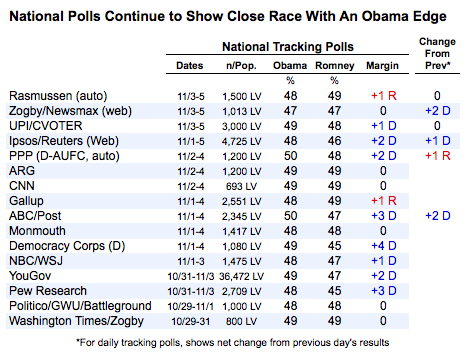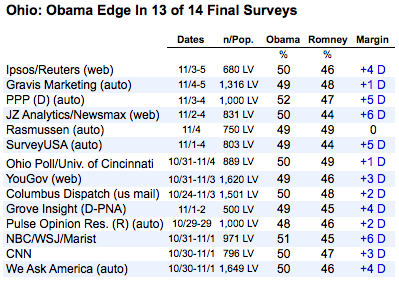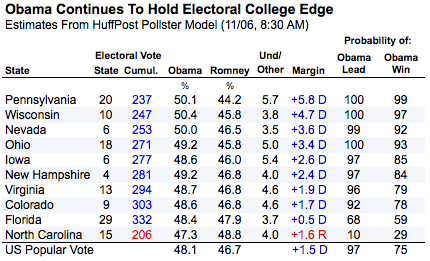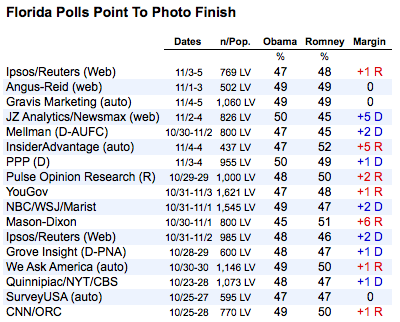WASHINGTON -- As millions of voters head to their polling places across the U.S., the final round of pre-election polls finds a close race nationwide, but collectively forecasts a narrow victory by President Barack Obama over Republican nominee Mitt Romney in enough battleground states to put Obama over the 270 electoral votes needed for victory.
The HuffPost Pollster tracking model created by Stanford political scientist Simon Jackman, which combines all available national and statewide polling data, finds that if polls fall within the historical ranges of polling accuracy, Obama stands a 91 percent chance of victory.
The remaining questions about the polling data are whether the final averages prove to be as collectively accurate as in past elections or whether some systematic error in the swing state surveys is concealing a hidden Romney advantage that will reveal itself when the votes are counted. There is also, perhaps, the issue of whether all voters will be allowed to cast ballots and whether all of their votes will be counted.
Nationally, 10 more pollsters reported their final results on Monday or Tuesday. The final round of national polls, including those released over the weekend, all show the race falling well within the typical random sampling error for a single national survey, with margins ranging from a 1 percentage-point Romney edge to a 4 point Obama advantage.
 When the Pollster tracking model combines all of the data into an estimate of the national popular vote, it now shows Obama holding a roughly 1.5 point advantage over Romney (48.1 to 46.7 percent), the best showing for Obama since just before the first presidential debate in October (the model will revise one more time on Tuesday morning to catch the last handful of final polls, and this article will be updated accordingly).
When the Pollster tracking model combines all of the data into an estimate of the national popular vote, it now shows Obama holding a roughly 1.5 point advantage over Romney (48.1 to 46.7 percent), the best showing for Obama since just before the first presidential debate in October (the model will revise one more time on Tuesday morning to catch the last handful of final polls, and this article will be updated accordingly).
Given the late deluge of data, the model says that Obama's narrow national advantage is statistically meaningful and does not result from random chance. When historical patterns of polling accuracy are factored in, the model now gives Obama a 75 percent chance of winning the national popular vote.
Far more importantly, the final polls show Obama maintaining his advantage in the critical battleground states. In Ohio, which continues to be the most important tipping point state in the race to win 270 electoral votes, 13 of the final 14 surveys show Obama nominally ahead, with one showing a tie.

The Pollster estimate for Ohio's 18 electoral votes now gives Obama a better than 3 percentage-point lead over Romney (49.2 percent to 45.8 percent) as of this writing. When combined with 3 to 4 percentage-point advantages in Wisconsin, Nevada and the other states where Obama leads by larger margins, the president would net 271 electoral votes, just one more than needed for victory. When historical patterns of polling error are factored in, the model gives Obama a better than 90 percent chance of winning in Ohio, Nevada and Wisconsin.

But the polls also give Obama narrower but statistically meaningful advantages of roughly 2.5 points in Iowa and nearly 2 points in New Hampshire, Virginia andColorado. If Obama wins in all of the states where he is leading, his electoral vote total would rise to 303 electoral votes.
Romney holds a statistically significant lead in North Carolina, which when combined with other states where he leads by larger margins, would bring his electoral vote total to 206.
In the final hours, Florida remains a true tossup, with the two candidates separated by a half a percentage point (48.4 to 47.9 percent). With typical patterns of polling accuracy factored in, the chances of Obama's tiny advantages translating into a Florida victory as of this writing are just 59 percent -- barely better than a coin toss.
A list of the final round of Florida's polls illustrates the pattern. Seven give Romney a nominal advantage, six give the edge to Obama and three show an exact tie.

As Simon Jackman explains separately, the question of how to best predict the electoral college outcome is tricky because of uncertainty about Florida. As shown in the graphic below, the model predicts several different electoral vote scenarios as most likely. If Obama wins every state in which the model currently shows him ahead (including the non-significant margin in Florida), he would win a total of 332 electoral votes, which is also the model's median estimate.
It is worth remembering that polling faces many new challenges in 2012, includingmore than a third of Americans living in "cell phone only" households, record rates of early voting and record-low response rates. The final surveys also include using automated telephone and opt-in internet methods, more than ever before. It is always possible that these developments could cause a polling misfire -- in either direction -- to a degree that lacks historical precedent, but with just hours remaining before the vote count begins, it would take just such a systematic error to change the verdict of the pre-election surveys.
The HuffPost Pollster tracking model created by Stanford political scientist Simon Jackman, which combines all available national and statewide polling data, finds that if polls fall within the historical ranges of polling accuracy, Obama stands a 91 percent chance of victory.
The remaining questions about the polling data are whether the final averages prove to be as collectively accurate as in past elections or whether some systematic error in the swing state surveys is concealing a hidden Romney advantage that will reveal itself when the votes are counted. There is also, perhaps, the issue of whether all voters will be allowed to cast ballots and whether all of their votes will be counted.
Nationally, 10 more pollsters reported their final results on Monday or Tuesday. The final round of national polls, including those released over the weekend, all show the race falling well within the typical random sampling error for a single national survey, with margins ranging from a 1 percentage-point Romney edge to a 4 point Obama advantage.

Given the late deluge of data, the model says that Obama's narrow national advantage is statistically meaningful and does not result from random chance. When historical patterns of polling accuracy are factored in, the model now gives Obama a 75 percent chance of winning the national popular vote.
Far more importantly, the final polls show Obama maintaining his advantage in the critical battleground states. In Ohio, which continues to be the most important tipping point state in the race to win 270 electoral votes, 13 of the final 14 surveys show Obama nominally ahead, with one showing a tie.

The Pollster estimate for Ohio's 18 electoral votes now gives Obama a better than 3 percentage-point lead over Romney (49.2 percent to 45.8 percent) as of this writing. When combined with 3 to 4 percentage-point advantages in Wisconsin, Nevada and the other states where Obama leads by larger margins, the president would net 271 electoral votes, just one more than needed for victory. When historical patterns of polling error are factored in, the model gives Obama a better than 90 percent chance of winning in Ohio, Nevada and Wisconsin.

But the polls also give Obama narrower but statistically meaningful advantages of roughly 2.5 points in Iowa and nearly 2 points in New Hampshire, Virginia andColorado. If Obama wins in all of the states where he is leading, his electoral vote total would rise to 303 electoral votes.
Romney holds a statistically significant lead in North Carolina, which when combined with other states where he leads by larger margins, would bring his electoral vote total to 206.
In the final hours, Florida remains a true tossup, with the two candidates separated by a half a percentage point (48.4 to 47.9 percent). With typical patterns of polling accuracy factored in, the chances of Obama's tiny advantages translating into a Florida victory as of this writing are just 59 percent -- barely better than a coin toss.
A list of the final round of Florida's polls illustrates the pattern. Seven give Romney a nominal advantage, six give the edge to Obama and three show an exact tie.

As Simon Jackman explains separately, the question of how to best predict the electoral college outcome is tricky because of uncertainty about Florida. As shown in the graphic below, the model predicts several different electoral vote scenarios as most likely. If Obama wins every state in which the model currently shows him ahead (including the non-significant margin in Florida), he would win a total of 332 electoral votes, which is also the model's median estimate.
It is worth remembering that polling faces many new challenges in 2012, includingmore than a third of Americans living in "cell phone only" households, record rates of early voting and record-low response rates. The final surveys also include using automated telephone and opt-in internet methods, more than ever before. It is always possible that these developments could cause a polling misfire -- in either direction -- to a degree that lacks historical precedent, but with just hours remaining before the vote count begins, it would take just such a systematic error to change the verdict of the pre-election surveys.

No comments:
Post a Comment